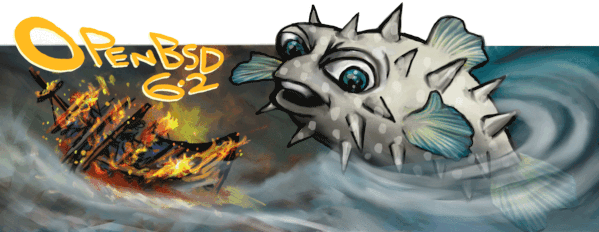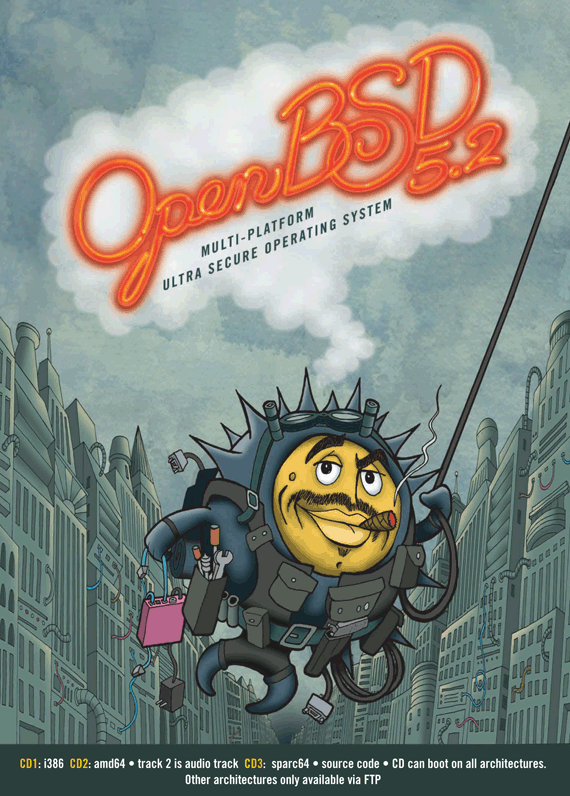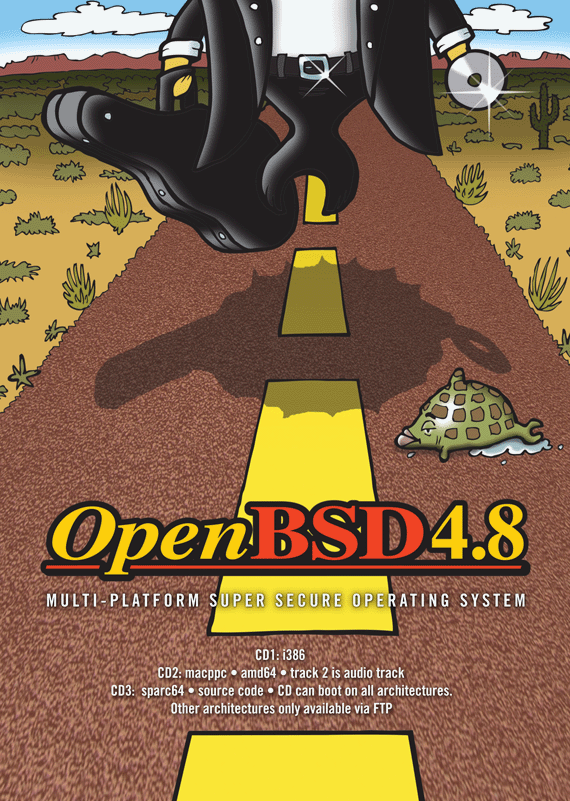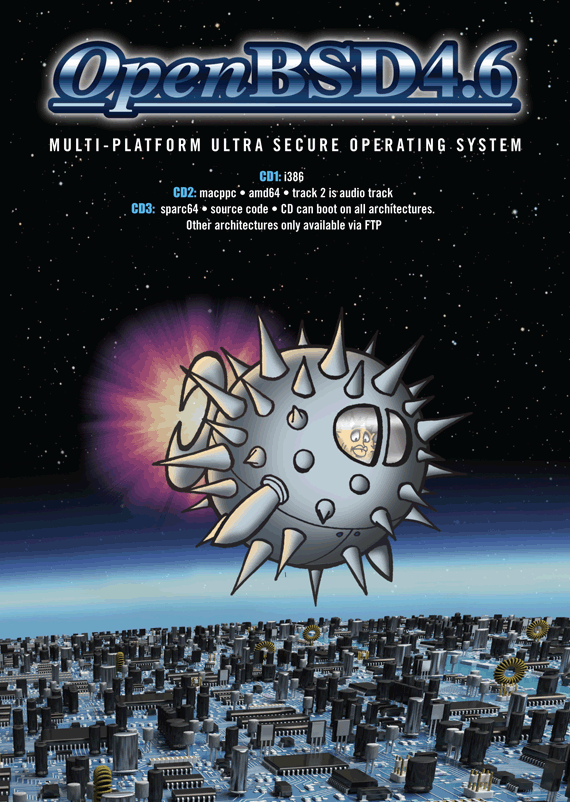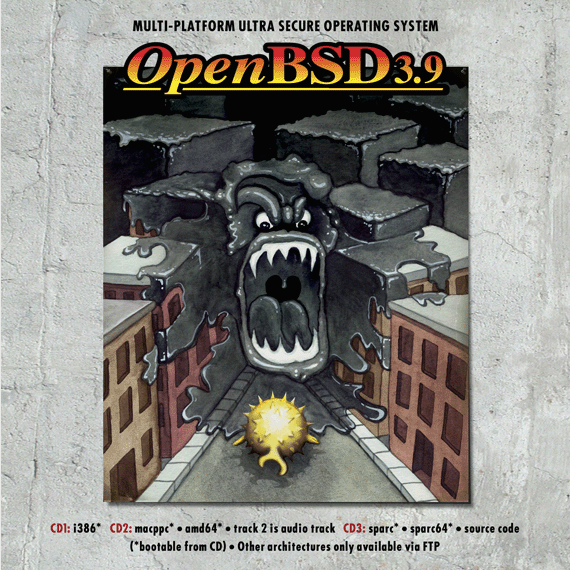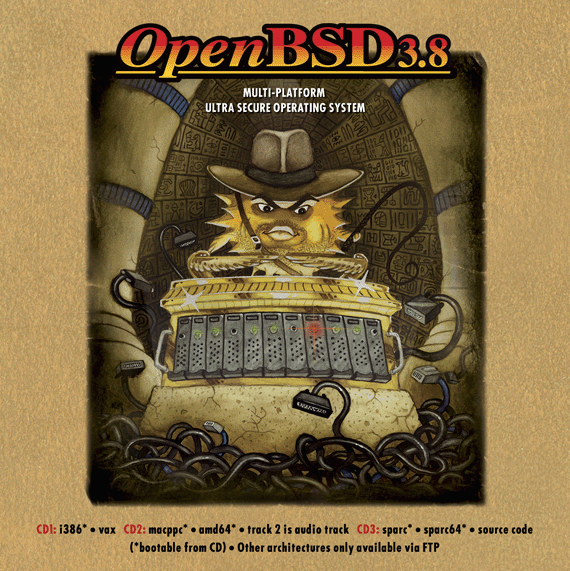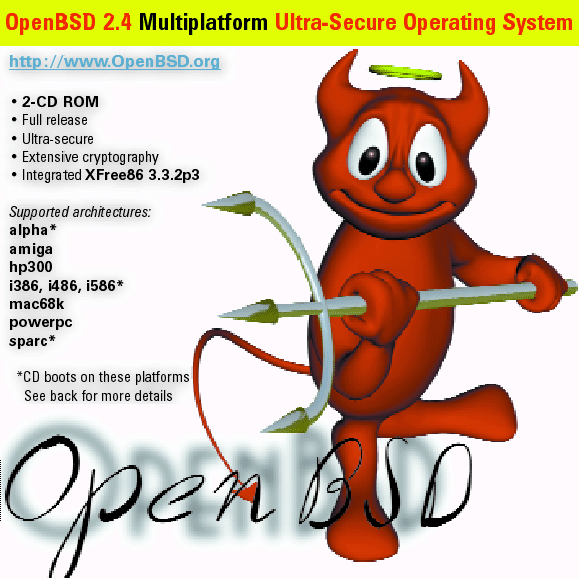-fret-clean is a clang extension that, upon return from a function cleans the return value off the stack (one of many information leaks which can be used to determine where functions in a different DSO reside). The kernel, libc, libcrypto, and ld.so(1) are compiled with this option. amd64 only, for now.
The kernel and ld.so register the precise entry location of every system call used by a program, as described in the new ELF section .openbsd.syscalls inside ld.so and libc.so. ld.so uses the new syscall pinsyscalls(2) to tell the kernel the precise entry location of system calls in libc.so. Since all syscall entries are now known to the kernel, the pininsyscall(SYS_execve) interface becomes redundant. msyscall(2) mechanism also becomes redundant (and is removed a bit later), because immutable memory + pinsyscalls together are cheaper and more effective targeting. Theo de Raadt, Jan 2024.
Mandatory enforcement of indirect branch targets (BTI on arm64, IBT on Intel amd64), unless a linker flag (-Wl,-z,nobtcfi) requests no enforcement.
ld.so and crt0 register the location of the execve(2) libc syscall stub with the kernel using pinsyscall(2), after which the kernel only accepts an execve call from that specific location. Theo de Raadt, Feb 2023. Made redundant by pinsyscalls(2) which handles all system calls.
Architectures which lack xonly mmu-enforcement can still benefit from switching to --execute-only binaries if the cpu generates different traps for instruction-fetch versus data-fetch. The VM system will not allow memory to be read before it was executed which is valuable together with library relinking. Architectures switched over include loongson. Theo de Raadt, Feb 2023.
On all architectures which lack hardware-enforcement of xonly, system calls are now prevented from reading (via copyin/copyinst) inside the program's main text, ld.so text, sigtramp text, or libc.so text. Theo de Raadt, Jan 2023.
Some architectures now have non-readable code ("xonly"), both from the perspective of userland reading its own memory, or the kernel trying to read memory in a system call. Many sloppy practices in userland code had to be repaired to allow this. The linker option --execute-only is enabled by default. In order of development: arm64, riscv64, hppa, amd64, powerpc64, powerpc (G5 only), octeon. sparc64 (sun4u only, unfinished). Mark Kettenis, Theo de Raadt, Visa Hankala, Miod Vallat, Dave Voutila, George Koehler in kernel and base, and Theo Buehler, Robert Nagy, Christian Weisgerber in ports. Dec 2022 - Feb 2023, still ongoing.
sshd random relinking at boot. Theo de Raadt. Jan 18, 2023.
Permissions (RWX, MAP_STACK, etc) on address space regions can be made immutable, so that mmap(2), mprotect(2) or munmap(2) fail with EPERM. Most of the program static address space is now automatically immutable (main program, ld.so, main stack, load-time shared libraries, and dlopen()'d libraries mapped without RTLD_NODELETE). Programmers can request non-immutable static data using the "openbsd.mutable" section, or manually bring immutability to (page aligned heap objects) using mimmutable(2). Theo de Raadt, Dec 4, 2022.
resolvd(8)
Written by Florian Obser and Theo de Raadt. Imported February 24, 2021; released with OpenBSD 6.9.
Game of Trees
Written and maintained by Stefan Sperling. Started in 2017, port available since August 9, 2019.
rpki-client(8)
Started by Kristaps Dzonsons. Imported June 17, 2019; released with OpenBSD 6.7. With significant contributions from Claudio Jeker, Theo Buehler, and Job Snijders.
sysupgrade(8)
Written by Christian Weisgerber, Florian Obser, and Theo de Raadt. Imported April 25, 2019; released with OpenBSD 6.6.
ober
ASN.1 basic encoding rules API, written by Claudio Jeker and Reyk Flöter. Started in 2006/07, moved to libutil on May 11, 2019, OpenBSD 6.6
System calls may only be performed from selected code regions
(main program, ld.so, libc.so, and sigtramp). The libc.so region
is setup by msyscall(2).
Theo de Raadt, November 28, 2019.
This mechanism was removed because later work on immutable memory +
pinned system calls was even better.
Similar to the opportunistic verification in MAP_STACK, system-calls can no longer be performed from PROT_WRITE memory. Theo de Raadt, June 2, 2019.
MAP_CONCEAL addition to mmap(2) disallows memory pages to be written to core dumps, preventing accidental exposure of private information. Theo de Raadt, Mark Kettenis and Scott Soule Cheloha, February 2, 2019.
RETGUARD is a replacement for the stack-protector which uses a per-function random cookie (located in the read-only ELF .openbsd.randomdata section) to consistency-check the return address on the stack. Implemented for amd64 and arm64 by Todd Mortimer in OpenBSD 6.4, for mips64 in OpenBSD 6.7, and powerpc/powerpc64 in OpenBSD 6.9. amd64 system call stubs also protected in OpenBSD 7.3.
MAP_STACK addition to mmap(2) allows opportunistic verification that the stack-register points at stack memory, therefore catching pivots to non-stack memory (sometimes used in ROP attacks). Theo de Raadt, April 12, 2018.
Reencoding of i386/amd64 instruction sequences to avoid embedded polymorphic RET instructions. Enhancements to clang(1) Todd Mortimer, April 28, 2018 and onwards.
Rearranged i386/amd64 register allocator order in clang(1) to reduce polymorphic RET instructions
Todd Mortimer, November 20, 2017.
Kernel relinking at boot
the .o files of the kernel are relinked in random order from a link-kit, before every reboot. This provides substantial interior randomization in the kernel's text and data segments for layout and relative branches/calls. Basically a unique address space for each kernel boot, similar to the userland fork+exec model described above but for the kernel. Theo de Raadt, June 2017.
trapsleds
Reduction of incidental NOP instructions/sequences in the instruction stream which could be useful potentially for ROP attack methods to inaccurately target gadgets. These NOP sequences are converted into trap sequences where possible. Todd Mortimer and Theo de Raadt, June 2017.
cvs2gitdump
Written and maintained by YASUOKA Masahiko. Started in 2012, port available since August 1, 2016.
audioctl(1)
Originally written by Lennart Augustsson in 1997, rewritten by Alexandre Ratchov since June 21, 2016 and first released with OpenBSD 6.0.

mknod(8)
Original version from Version 6 AT&T UNIX (1975), last rewritten by Marc Espie on March 5, 2016 and first released with OpenBSD 6.0.
pdisk(8)
Originally written by Eryk Vershen in 1996-1998, rewritten by Kenneth Westerback since January 11, 2016 and first released with OpenBSD 5.9.

Use of fork+exec in privilege separated programs. The strategy is to give each process a fresh & unique address space for ASLR, stack protector -- as protection against address space discovery attacks. Implemented first by Damien Miller (sshd(8) 2004), Claudio Jeker (bgpd(8), 2015), Eric Faurot (smtpd(8), 2016), Rafael Zalamena (various, 2016), and others.
Process layouts in memory tightened to remove execute permission from all segmented, non-instruction data and to remove write permission from data that is only modified during loading and relocation. By combining the RELRO (Read-Only after Relocation) design from the GNU project with the original ASLR work from OpenBSD 3.3 and strict lazy-binding work from OpenBSD 5.9, this is applied to not just a subset of programs and libraries but rather to all programs and libraries. Implemented for OpenBSD 6.1 by Philip Guenther in August 2016.
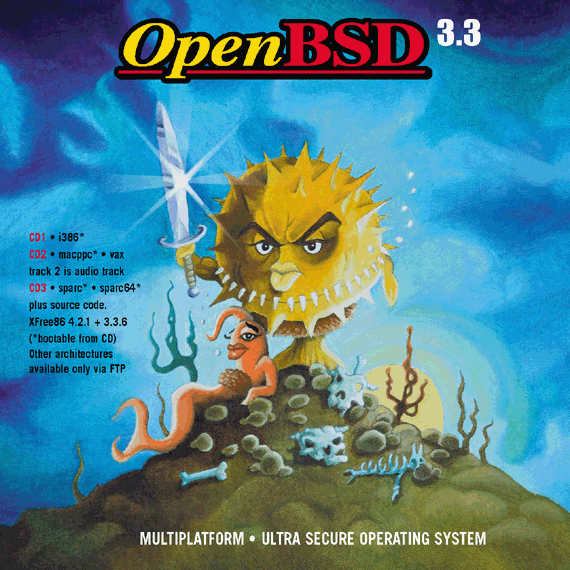
Library order randomization
In rc(8), re-link
libc.so, libcrypto, and ld.so
on startup, placing the objects in a random order.
Theo de Raadt and Robert Peichaer, May 2016,
enabled by default since OpenBSD 6.0 and 6.2.
SROP (sigreturn(2) oriented programming) mitigation
attacks researched by Eric Bosman and Herbert Bos in 2014, solution implemented by Theo de Raadt in May 2016, enabled by default since OpenBSD 6.0.
eigrpd(8), eigrpctl(8)
Written by Renato Westphal. Imported October 2, 2015 and first released with OpenBSD 5.9.
file(1)
Rewritten from scratch by Nicholas Marriott. Imported April 24, 2015 and first released with OpenBSD 5.8.
getpwnam_shadow(3), getpwuid_shadow(3)
Ted Unangst and Theo de Raadt, November 18, 2015, OpenBSD 5.9
Kernel-assisted lazy-binding for W^X safety in multi-threaded programs. A new syscall kbind(2) permits lazy-binding to be W^X safe in multi-threaded programs. Implemented for OpenBSD 5.9 by Philip Guenther in July 2015.
portroach
Written and maintained by Jasper Lievisse Adriaanse, originally forked from FreeBSD's portscout. Started in 2014, port available since September 5, 2014.
docbook2mdoc
Started by Kristaps Dzonsons in 2014, maintained by Ingo Schwarze. Port available since April 3, 2014.
LibreSSL
Started by Ted Unangst, Bob Beck, Joel Sing, Miod Vallat, Philip Guenther, and Theo de Raadt on April 13, 2014, as a fork of OpenSSL 1.0.1g. First released with OpenBSD 5.6. With significant contributions from Theo Buehler.
asr
Replacement resolver written by Eric Faurot. Imported April 14, 2012; activated on March 26, 2014, OpenBSD 5.6.
ohash
Written by Marc Espie. In libutil since May 12, 2014, OpenBSD 5.6; used by make(1) and m4(1) before that.
toad
Written and maintained by Antoine Jacoutot. Started in 2013, port available since October 8, 2013.
sndiod(8)
Written by Alexandre Ratchov. Imported November 23, 2012 and first released with OpenBSD 5.3.
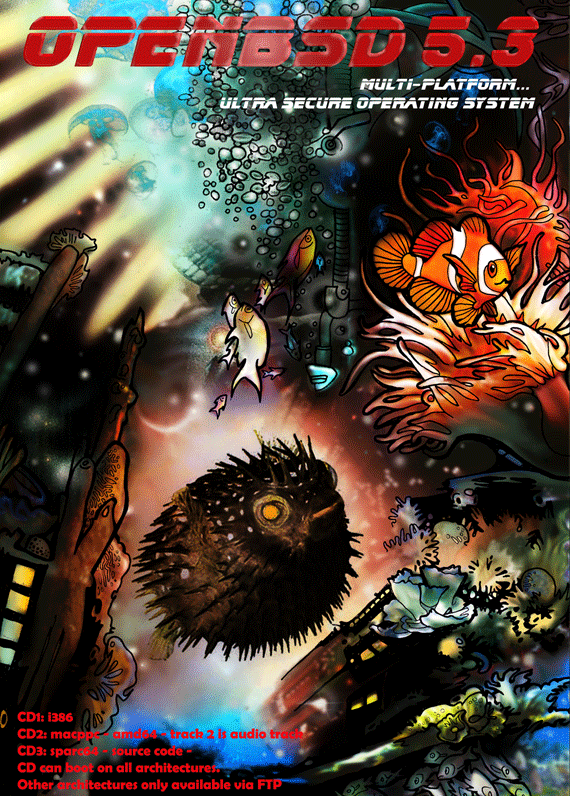
ldomd(8), ldomctl(8)
Written by Mark Kettenis. Imported October 26, 2012 and first released with OpenBSD 5.3.
Static-PIE
Position-independent static binaries for /bin, /sbin and ramdisks. Implemented for OpenBSD 5.7 by Kurt Miller and Mark Kettenis.
Stack protector per shared object
using the random-data memory feature, each shared object was given its own stack protector cookie in OpenBSD 5.3 by Matthew Dempsky.
Random-data memory
the ability to specify that a variable should be initialized at load time with random byte values (placed into a new ELF .openbsd.randomdata section) was implemented in OpenBSD 5.3 by Matthew Dempsky.
Position-independent executables (PIE)
OpenBSD 5.3 was the first widely used operating system to enable it globally by default, on seven hardware platforms. Implemented in November 2008 by Kurt Miller and enabled by default by Pascal Stumpf in August 2012.
npppd(8), npppctl(8)
Started by Internet Initiative Japan Inc. Imported January 11, 2010, first released with OpenBSD 5.3. Maintained by YASUOKA Masahiko.
rc.d(8), rc.subr(8)
Written by Antoine Jacoutot and Robert Nagy. Imported October 26, 2010 and first released with OpenBSD 4.9.
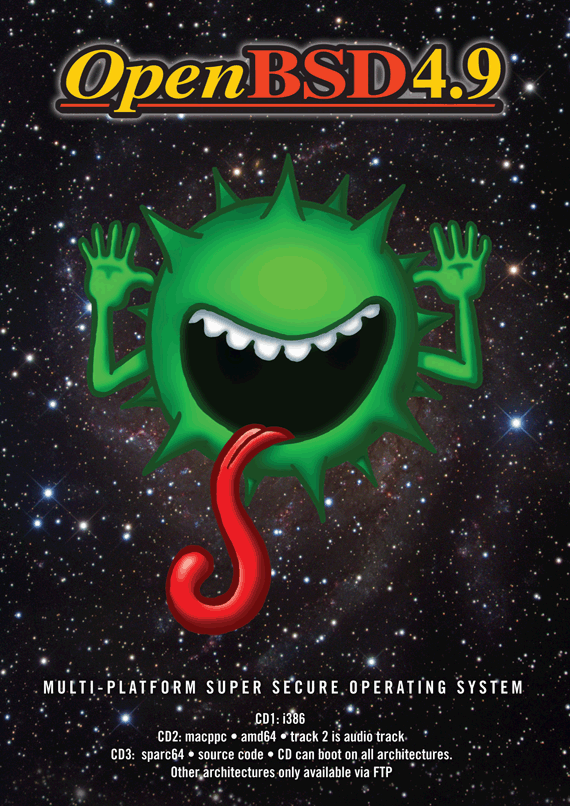
iscsid(8), iscsictl(8)
Written by Claudio Jeker. Imported September 24, 2010 and first released with OpenBSD 4.9.
ldapd(8), ldapctl(8)
Written by Martin Hedenfalk. Imported May 31, 2010 and first released with OpenBSD 4.8.
dpb(1)
Started by Nikolay Sturm on August 10, 2004; first available for OpenBSD 3.6. Rewritten by Marc Espie since August 20, 2010.
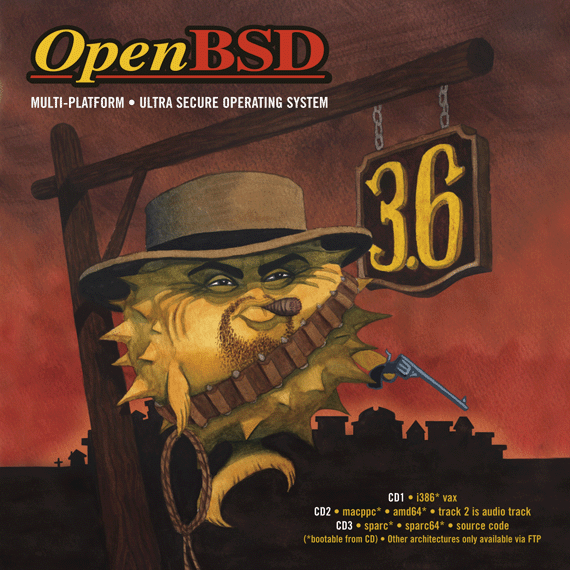
imsg
Message passing API, written by Henning Brauer. In libutil since May 26, 2010, OpenBSD 4.8; used by various daemons before that.
mandoc including mandoc(1), man(1), apropos(1), makewhatis(8), man.cgi(8)
Started by Kristaps Dzonsons in November 2008. Imported April 6, 2009, first released with OpenBSD 4.8. With significant contributions from Ingo Schwarze.
OpenSMTPD including smtpd(8), smtpctl(8), makemap(8)
Started by Gilles Chehade. Imported November 1, 2008 and first released with OpenBSD 4.6. With significant contributions from Eric Faurot.
ypldap(8)
Started by Pierre-Yves Ritschard. Imported June 26, 2008 and first released with OpenBSD 4.4.
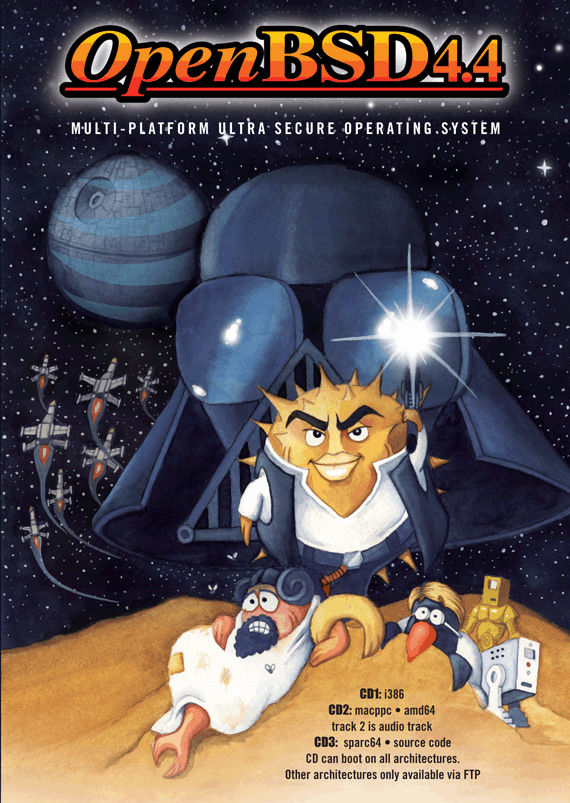
sysmerge(8)
Written by Antoine Jacoutot, originally forked from mergemaster by Douglas Barton. Imported April 22, 2008, first released with OpenBSD 4.4.
fdm
Written and maintained by Nicholas Marriott. Started in 2006, port available since January 18, 2007.
snmpd(8)
Started by Reyk Flöter. Imported December 5, 2007 and first released with OpenBSD 4.3. With many improvements by Martijn van Duren.
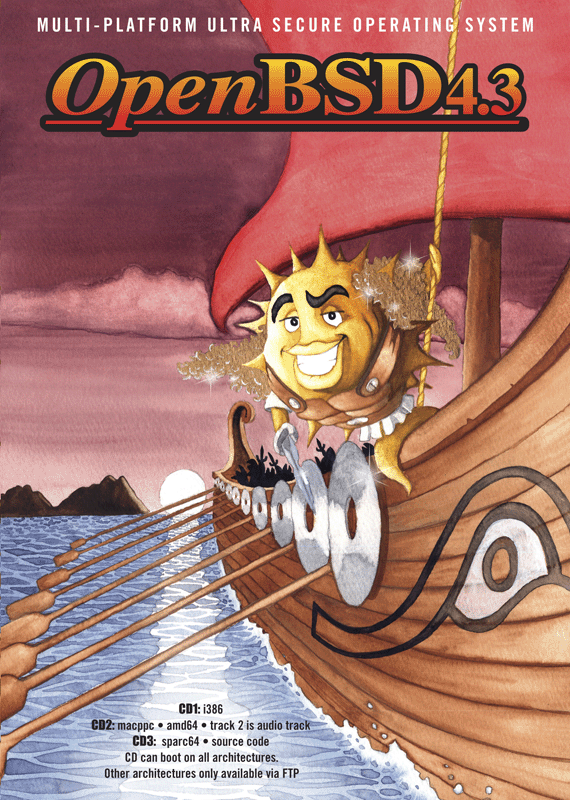
libtool(1)
Written by Steven Mestdagh and Marc Espie. Imported October 28, 2007 and first available for OpenBSD 4.3.
ospf6d(8), ospf6ctl(8)
Started by Esben Norby and Claudio Jeker. Imported October 8, 2007 and first released with OpenBSD 4.2.
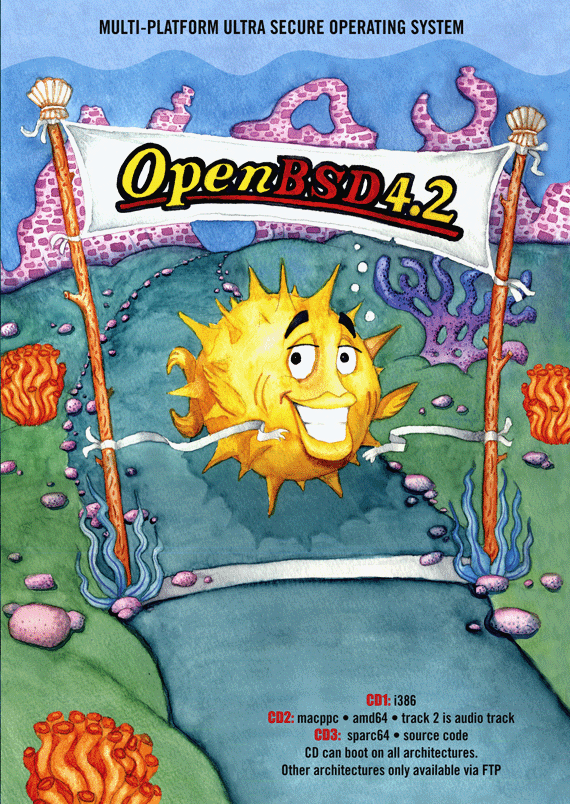
cwm(1)
Started by Marius Aamodt Eriksen in 2004. Imported April 27, 2007 and first released with OpenBSD 4.2. With many improvements by Okan Demirmen.
relayd(8) with relayctl(8)
Started by Pierre-Yves Ritschard and Reyk Flöter. Imported December 16, 2006 and first released with OpenBSD 4.1. With improvements from Sebastian Benoit, Claudio Jeker, and others.
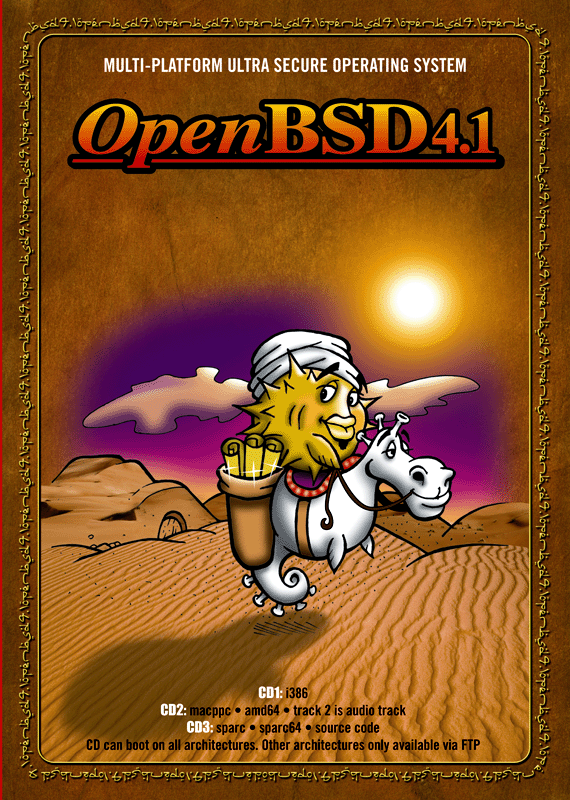
pkg-config(1)
Started by Chris Kuethe and Marc Espie. Imported November 27, 2006 and first released with OpenBSD 4.1. Deleted after OpenBSD 7.7 because pkgconf is more actively maintained and more efficient.
dvmrpd(8), dvmrpctl(8)
Started by Esben Norby. Imported June 1, 2006 and first released with OpenBSD 4.0.
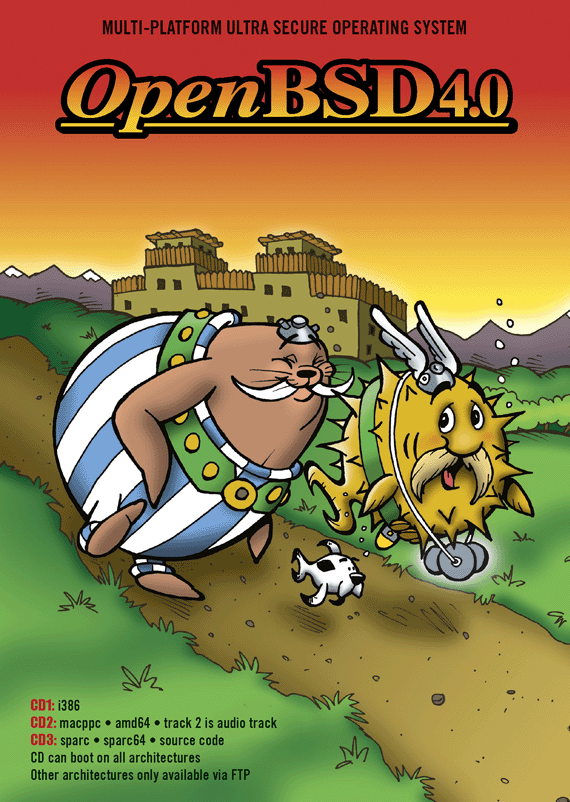
midish
Written and maintained by Alexandre Ratchov. Started in 2003, port available since November 4, 2005.
femail
Written and maintained by Henning Brauer. Started in 2005, port available since September 22, 2005.
ospfd(8), ospfctl(8)
Started by Esben Norby and Claudio Jeker. Imported January 28, 2005 and first released with OpenBSD 3.7.
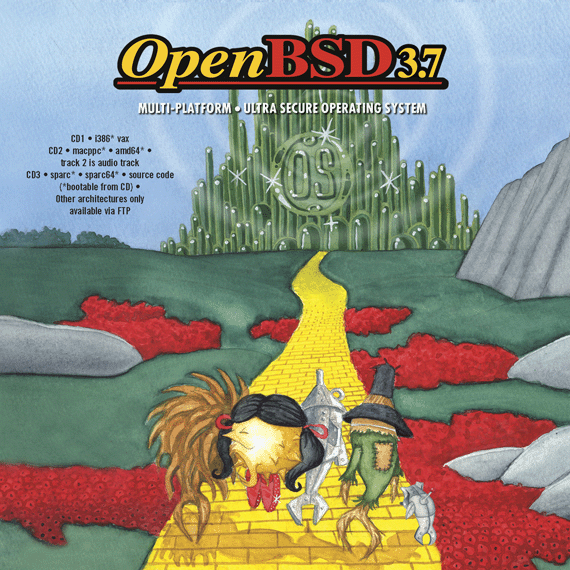
ifstated(8)
Started by Marco Pfatschbacher and Ryan McBride. Imported January 23, 2004 and first released with OpenBSD 3.8.
hotplugd(8)
Started by Alexander Yurchenko. Imported May 30, 2004 and first released with OpenBSD 3.6.
dhcpd(8)
Started by Ted Lemon in 1995. Imported April 13, 2004 and first released with OpenBSD 3.6. Reworked by Kenneth Westerback and Henning Brauer.
dhclient(8)
Started by Ted Lemon and Elliot Poger in 1996. Imported January 18, 2004 and first released with OpenBSD 3.5. Reworked by Henning Brauer and Kenneth Westerback. Deleted after OpenBSD 7.5 because dhcpleased(8) is even better.
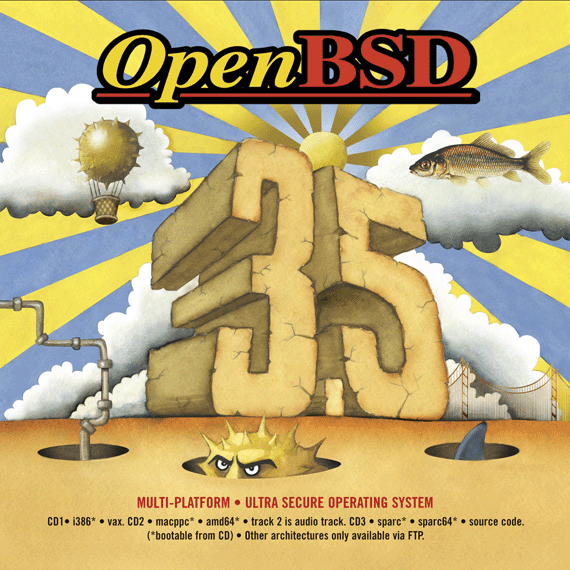
carp(4)
Written by Mickey Shalayeff, Markus Friedl, Marco Pfatschbacher, and Ryan McBride. Imported October 17, 2003 and first released with OpenBSD 3.5.
sensorsd(8)
Started by Henning Brauer. Imported September 24, 2003 and first released with OpenBSD 3.5. Reworked by Constantine A. Murenin.
malloc(3) randomization implemented by Thierry Deval. Guard pages and randomized (delayed) free added by Ted Unangst. Reimplemented by Otto Moerbeek for OpenBSD 4.4.
gcc-local(1) __attribute__((__bounded__)) static analysis annotation and checking mechanism
Started by Anil Madhavapeddy on June 26, 2003 and ported to GCC 4 by Nicholas Marriott. First released with OpenBSD 3.4.
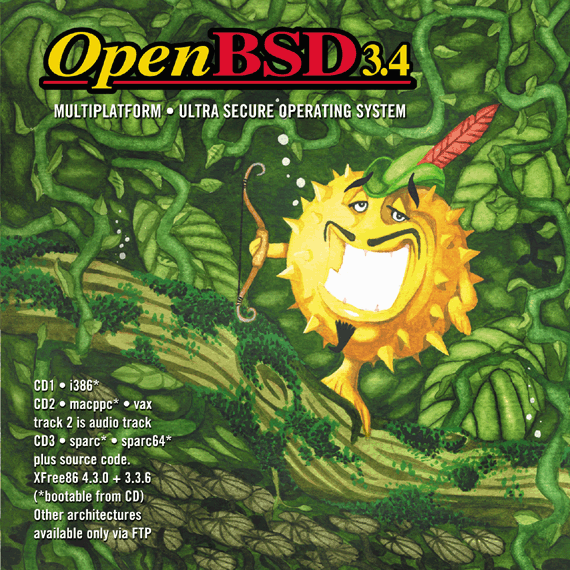
systrace(4), systrace(1)
Started by Niels Provos. Imported June 4, 2002 and first released with OpenBSD 3.2. Deleted after OpenBSD 5.9 because pledge(2) is even better.
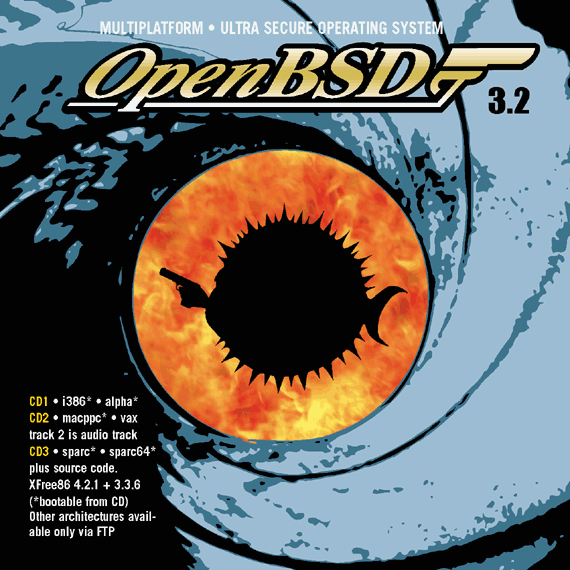
Privilege revocation
Related to the work on privilege separation, some programs were refactored to drop privileges while holding onto a tricky resource such as a raw socket, reserved port, or modification-locked bpf(4) descriptor, for example ping(8), traceroute(8), etc.
Privilege separation
First implemented by Niels Provos and Markus Friedl in OpenSSH in March 2002, released with OpenBSD 3.2. The concept is now used in many OpenBSD programs, for example bgpd(8), dhclient(8), dhcpd(8), dvmrpd(8), eigrpd(8), file(1), httpd(8), iked(8), ldapd(8), ldpd(8), mountd(8), npppd(8), ntpd(8), ospfd(8), ospf6d(8), pflogd(8), radiusd(8), relayd(8), ripd(8), script(1), smtpd(8), syslogd(8), tcpdump(8), tmux(1), xconsole(1), xdm(1), Xserver(1), ypldap(8), pkg_add(1), etc.
pf(4), pfctl(8), pflogd(8), authpf(8), ftp-proxy(8)
Written by Daniel Hartmeier and Henning Brauer as a replacement for the non-free ipf by Darren Reed. Imported June 24, 2001 and first released with OpenBSD 3.0.
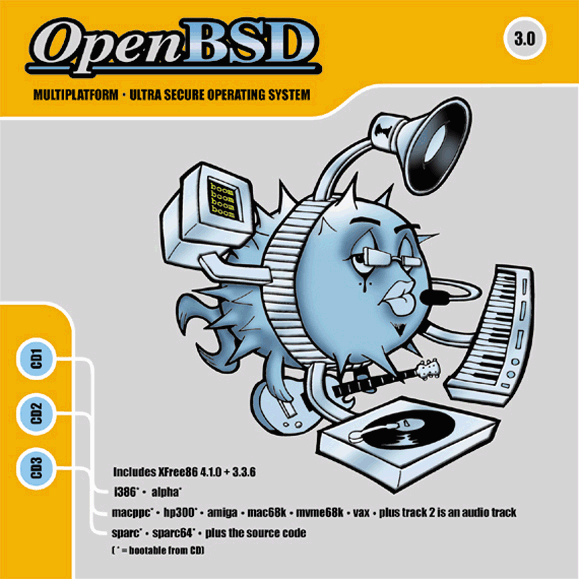
ASLR
OpenBSD 3.4 was the first widely used operating system to provide it by default.
GOT and PLT protection by ld.so
first done as part of the W^X work in OpenBSD 3.3, by Dale Rahn and Theo de Raadt. The GOT and PLT regions are read-only outside of ld.so itself. Extended to the .init/.fini sections (constructors and destructors) in OpenBSD 3.4.
W^X
First used for sparc, sparc64, alpha, and hppa in OpenBSD 3.3.
Strictly enforced by default since OpenBSD 6.0: a program can only
violate it if the executable is marked with PT_OPENBSD_WXNEEDED
and it is located on a filesystem mounted with the wxallowed
mount(8) option.
Stack protector
Developed since 2001 as "propolice" by Hiroaki Etoh. Integrated, and implemented for additional hardware platforms, by Federico G. Schwindt, Miod Vallat and Theo de Raadt. OpenBSD 3.3 was the first operating system to enable it systemwide by default.
mg(1)
Started by Dave Conroy in November 1986. Imported February 25, 2000 and first released with OpenBSD 2.7. Improved by Kjell Wooding, Mark Lumsden, and others.
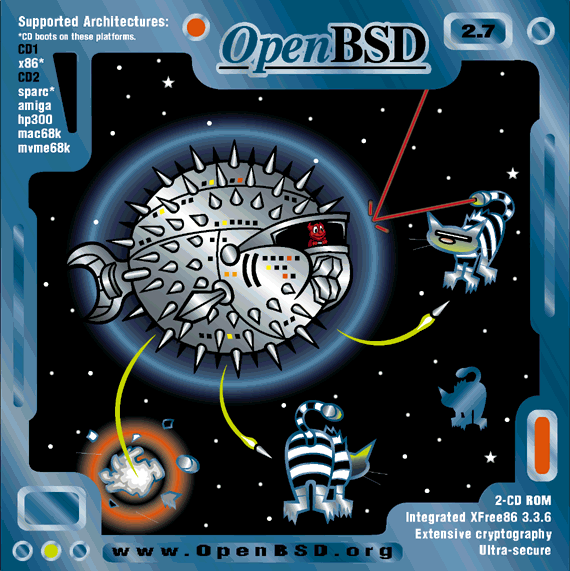
sudo
Started by Bob Coggeshall and Cliff Spencer around 1980. Imported November 18, 1999, first released with OpenBSD 2.7. Now maintained by Todd Miller.
m4(1)
Originally implemented by Ozan Yigit and Richard A. O'Keefe for 4.3BSD-Reno. Considerably extended by Marc Espie since 1999.
OpenSSH including ssh(1), scp(1), sftp(1), ssh-add(1), ssh-agent(1), ssh-keygen(1), sshd(8), sftp-server(8): Started by Aaron Campbell, Bob Beck, Dug Song, Markus Friedl, Niels Provos, and Theo de Raadt as a fork of SSH 1.2.12 by Tatu Ylonen. Imported September 26, 1999 and first released with OpenBSD 2.6. Now maintained by Markus Friedl, Damien Miller, Darren Tucker, and Theo de Raadt.
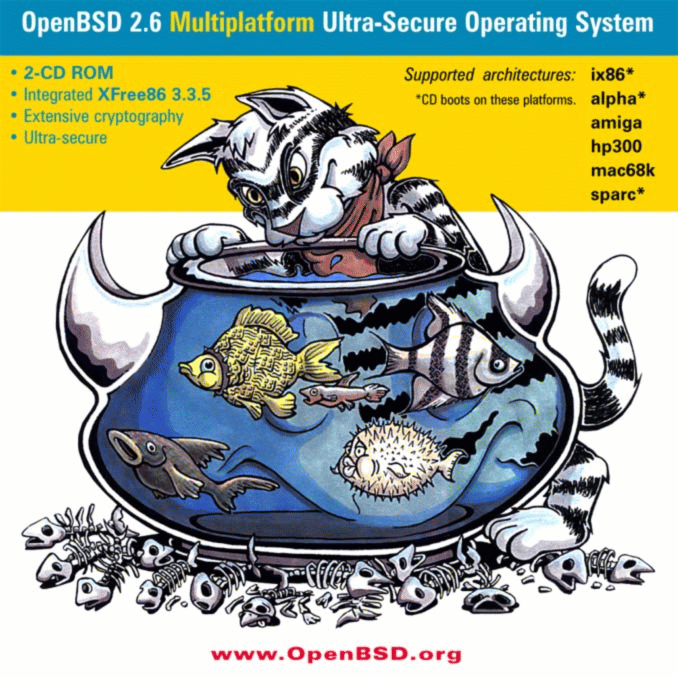
inet6(4)
First complete integration and adoption of IPv6 led by "Itojun" (Dr. Junichiro Hagino) [WIDE/KAME], Craig Metz [NRL], and Angelos D. Keromytis starting Jan 6, 1999. Almost fully operational Jun 6, 1999 during the first OpenBSD hackathon. OpenBSD 2.7.
aucat(1)
Written by Kenneth Stailey and Alexandre Ratchov. Imported January 2, 1997 and first released with OpenBSD 2.1.
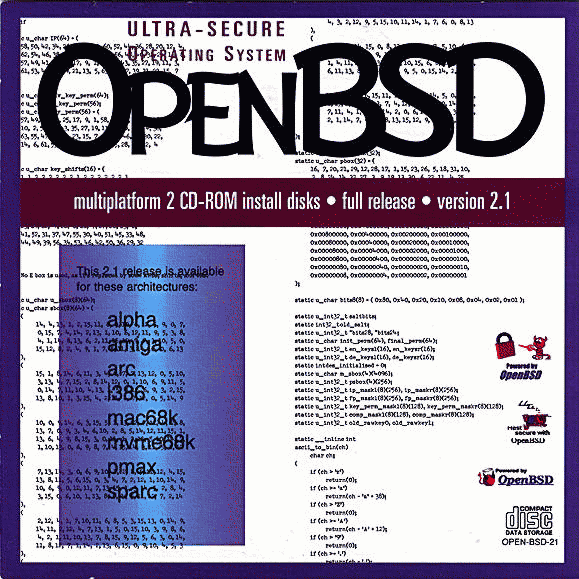
bcrypt(3)
Implemented by Niels Provos and David Mazieres Imported February 13, 1997 and first released with OpenBSD 2.1.
ipsec(4)
Started by John Ioannidis, Angelos D. Keromytis, Niels Provos, and Niklas Hallqvist, imported February 20, 1997. OpenBSD was the first free operating system to provide an IPSec stack.
mopd(8)
Started by Mats O. Jansson in 1993. Imported September 21, 1996 and first released with OpenBSD 2.0.

ypserv(8)
Started by Mats O. Jansson in 1994. Imported October 23, 1995 and first released with OpenBSD 2.0.
ypbind(8), ypset(8), ypcat(1), ypmatch(1), ypwhich(1), and libc support
Started by Theo de Raadt. Imported April 26, 1993 and first released with NetBSD 0.9.






